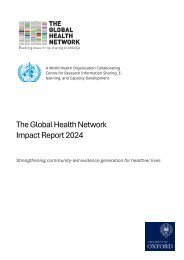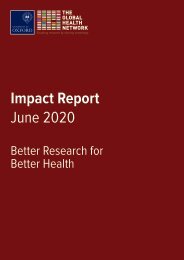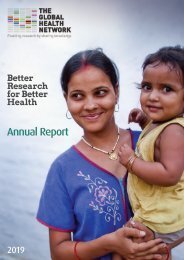ARCH Stakeholder Mapping Report
Create successful ePaper yourself
Turn your PDF publications into a flip-book with our unique Google optimized e-Paper software.
1. Introduction: Applying Research to Policy and Practice for Health (<strong>ARCH</strong>) programme<br />
Currently, there is wide separation between teams that undertake health research, those making decisions on health<br />
priorities and policies, and those who are delivering healthcare, particularly in resource-limited settings. Research<br />
considered “successful” typically concludes with the publishing of papers. Less attention is paid to how, and indeed if,<br />
those findings are made visible and accessible to those tasked with decision-making and clinical caregiving. Further,<br />
those working in delivering healthcare are often not aware of new interventions and have no means to determine if<br />
they would bring benefit to their community. Such health interventions could be novel treatments or new approaches<br />
to practice and prevention that would serve to address their local health priorities. Health researchers, decision-makers<br />
and implementers need to work together better to ensure that research evidence is made easily accessible as<br />
recommendations that can be taken up into policy and practice at all levels.<br />
Previous efforts to enable taking research into practice have typically been short-term focussing on a single intervention<br />
or product for a specific disease. As a result, this work was not well-established or embedded into programmes or<br />
institutions. Together these factors represent barriers to the implementation of proven interventions, treatments and<br />
vaccines which ultimately limit the potential benefits to human health. This programme builds upon proven and existing<br />
systems that successfully bring global health organisations together to create efficiency and strong impact by facilitating<br />
knowledge exchange, active coordination, and collaboration.<br />
The Global Health Network aims to bring together researchers, policymakers, and implementers to address these gaps<br />
in research uptake to both conduct research to better understand this landscape and together develop the associated<br />
mechanisms to bridge these gaps. In doing so, we aim to:<br />
• Foster a global, multi-disciplinary community of practice, bringing together research, development, and policyexperts<br />
to share best practice and exchange knowledge and skills. The community will be brought together<br />
through a digital knowledge hub.<br />
• Understand the research uptake landscape, including stakeholders, barriers, and opportunities, in order to<br />
develop and deliver the tools, resources and training needed to support researchers, policymakers and<br />
development partners in this work.<br />
• Embed a network of Coordinators across the Global South, ensuring the contextual barriers and enablers for<br />
research uptake are understood and addressed throughout this work and bridging between local and global<br />
initiatives within this project.<br />
• Apply advanced digital technology to enable rapid synthesis of available research findings and<br />
recommendations to drive improvements in research uptake, beginning with the findings from the ZIKV<br />
outbreak.<br />
This 2-year Wellcome-funded proof of concept award will develop a strong evidence base for this work and bring<br />
together a global community of practice.<br />
2. <strong>Stakeholder</strong> mapping<br />
As part of the <strong>ARCH</strong> programme, there is a need to understand the research uptake landscape. Partnerships with key<br />
stakeholder groups involved in the various aspects of the research uptake are crucial to ensure this project amplifies<br />
existing and ongoing work, reduces duplication and that the strategy and initiatives meet the needs of the health<br />
research community. A key activity to inform who these groups are and how to engage with them is a stakeholder<br />
mapping exercise.<br />
With input from Wellcome and DHSC, in March 2021 we conducted a stakeholder mapping exercise to understand who<br />
these key stakeholders are, why they might be interested, how important their involvement is, and how to engage with<br />
them in a way that can contribute to successful research uptake. Specifically, we conducted the stakeholder mapping<br />
exercise to build a common understanding on significant stakeholders within the research uptake landscape and who<br />
3






